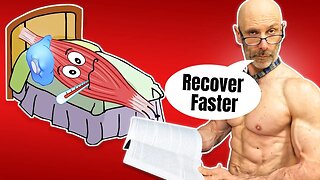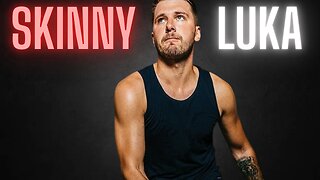Premium Only Content

Protein Powder For Men Over 50 (The Good, The Bad And The Ugly)
Protein powder for men over 50(the good, the bad and the ugly)
Thumbnail says “waste of money” picture of me holding a scoop of protein powder with dollar bills flying away in the background
There are three groups of people that require more protein than average, those who are recovering from an injury or surgery, older adults and people who are hard training or very active.
Most of us in the fit and fifty crew are in both of those last two categories.
We all know protein plays a role in protecting our muscle mass as we age, but the importance of protein goes far beyond this.
60% of our body is made up of water, 20% is made from protein, and it’s in every cell of our body, with it being necessary for things like immune system function and digestion.
Protein has been shown to improve satiety and help us lose excess body fat. So getting enough is a must.
But is protein powder the best way to do this, or is it just a waste of money?
If you are interested in losing body fat and adding muscle, please email me at 1shark1bite@gmail.com for information on my personal training services.
If you would like a set of Torrobands for yourself, here is my affiliate link so you can receive 50% off on your purchase https://sale.torroband.com/?affId=555B3E5D
Check your testosterone levels from home. Just click this link http://trylgc.com/laurence and receive 20% off with code: LAURENCE20 I receive commissions on referrals to LetsGetChecked. I only recommend services I know and trust.
My Affiliate link to Lebert for their Equalizer bars and more; https://lebertfitness.com/?ref=FitAnd50 and use the discount code FITAND50 you will receive 20% off your purchase
Facebook; https://www.facebook.com/Fit-and-50-5...
My Amazon page link; https://www.amazon.com/shop/fitand50
They did a study on a group of overweight men with an average age of 47. They compared the feeling of fullness and satiety between a normal protein intake, which they defined as 14% of total daily calories. To a high protein group that had 25% of their daily calories being protein.
They found that this increase in protein cut cravings by 60 %.
Reducing food cravings goes a long way in helping us stick to a calorie-reduced meal plan.
One of the ways protein does this is by reducing the hunger hormone ghrelin (grr-el-in). In a 2,006 study, they found that consuming a high protein breakfast when compared to a breakfast high in carbohydrates had not only a greater reduction in ghrelin, but it digested slower as well.
The first study I mention used real food. The second study used a mix of yogurt and whey protein isolate.
If you look at enough studies, you will see that a protein supplement can help to improve satiety, but that doesn’t make it the best choice.
Most people can easily get enough protein through food,if to eat, it only makes sense to eat food and not drink it.
I’m talking about all protein sources here, not just meats, but eggs, beans, lentils, nuts, seeds, and even whole grains contain dietary protein. The absorbability varies, but it all counts toward your daily protein intake.
In addition to this, you have other nutrients that you need, and they are found in high protein food like, vitamins, minerals, fats and in the case of non-meat sources, fibre, an often neglected and essential nutrient.
The most significant advantage of a protein supplement is convenience. What we don’t want to do is sacrifice quality for convenience, and we’re at risk of this because protein powders are considered a dietary supplement and isn’t regulated the same way as food or medicine.
Which could have us purchasing a product that doesn’t contain what it’s supposed to, or it may have additional ingredients other than what’s on the label.
To offset this risk, reputable companies arrange for independent third-party testing to ensure accuracy and safety.
In addition to looking for independent testing, I would recommend going for as high a protein content per serving as possible. This will be found in a protein isolate.
Again it's important to check the label as sometimes they will blend a protein isolate with a protein concentrate which has less protein and more of the things we don’t want, like in the case of whey protein, lactose. Which is a milk sugar, and when we take protein powder, we want protein, not sugar. If you’re lactose intolerant, you may want to go with a plant source of protein.
To get a complete protein with all the essential amino acids, it’s best to blend 2 or more plant sources.
I would recommend you find one that’s blended with pea protein as it’s high in branch chain amino acids which are needed to maximally stimulate muscle protein synthesis.
I briefly want to talk about hydrolyzed protein powders. These contain protein that has been pre-digested which sounds kind of gross, but it makes it easier to absorb. So for those who get an upset stomach from protein, this could be beneficial.
-
 4:53
4:53
Fit and 50
1 year ago $0.07 earnedHow to Speed Up Muscle Recovery Over 50 (Recover Like a 20 yr old)
5744 -
 35:05
35:05
Stephen Gardner
4 hours ago🔥Obama will be FORCED to Testify in Trump trial?
11.1K28 -
 9:08
9:08
Tundra Tactical
1 hour agoTundra Tactical Political Memes Review!
4.46K -
 LIVE
LIVE
GloryJean
2 hours agoDuos w/ Spartakus 🔥 LOCK IN for Games w/ PASSION
23 watching -
 LIVE
LIVE
Sgt Wilky Plays
2 hours agoSniper in the bushes
30 watching -
 LIVE
LIVE
Kimberly Guilfoyle
5 hours ago"Burns Bags" at FBI, What's Next? Interview with Former Agent John Nantz | Ep242
540 watching -
 LIVE
LIVE
RamrodJenkins
2 hours agoI'm HYPED for BF6 so let's play some 2042!
25 watching -
 LIVE
LIVE
FusedAegisTV
8 hours agoInto The Belly Of Human Cognition | Persona 5 Royal PART 23
26 watching -
 6:00
6:00
SKAP ATTACK
10 hours ago $0.34 earnedSkinny Luka is Terrifying
6.47K -
 18:33
18:33
World2Briggs
6 hours ago $0.47 earnedWhy Did Mississippi Go From Rich To Poor?
7.42K8